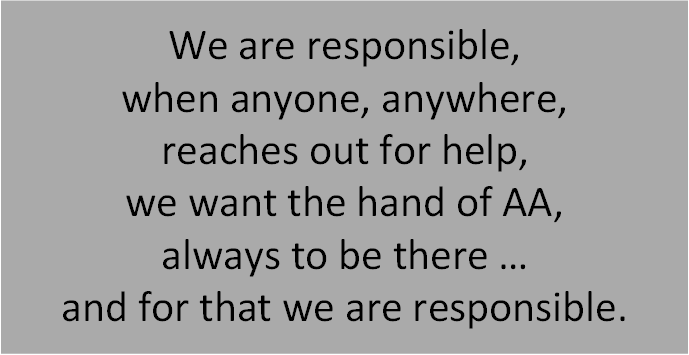A longtime member recently took stock of her A.A. giving:
“You know, as I was planning my Christmas shopping this year, I realized how much more I spend on gifts now than I did when I came into A.A., more than 20 years ago. I compared that with what I put in the basket at meetings, and I still give the same dollar bill only today it’s worth less. That was quite a revelation to me, and now I’ve begun putting at least two dollars in the hat at every meeting.”
In these days of galloping inflation, with most groups paying high rents (and coffee prices), it’s easy to lose sight of the impulse to give. Yet many A.A.’s are tossing more into the hat, and at the holiday season, groups often make a point of showing their gratitude by extra gifts of money, as well as time and service.
November and December business meetings frequently discuss additional contributions in gratitude to service entities such as intergroups, area committees, and G.S.O. Special thank-you checks also go to non-A.A.’s who help by setting up meeting rooms, making coffee, or performing other services in churches and other meeting places.
And holiday parties are part of the season’s giving, though members usually make special donations of food, time, or money – rather than taking funds from group treasuries for social events.
One New York City group holds an annual Thanksgiving Day buffet for A.A.’s who are alone on that day. And all over North America, group Christmas and New Year parties help members, new and old, get through the often-difficult holiday blues.
The holidays, though, are only one special time for giving. In reality, it’s what we do all year round. Increasingly, A.A. ’s are realizing that money is not a dirty word. Money and spirituality do mix, and gifts of money are one of our most important expressions of gratitude and responsibility.
Responding to this growing awareness of financial responsibility, service workers are making an effort to see that members are aware of the needs. The Washington Area Intergroup Association has found an effective way to help groups make decisions about contributions. Office manager Jim M. writes:
“About a year ago, the W.A.I.A. put together a form for group contributions. Because of the nature of our illness, many of us who have been elected treasurer of a group never had a bank account while drinking. For nearly all of us, management of money was a mess. The purpose of this form is to simplify the treasurer’s job. It also provides a simple, convenient form for his or her records. Distribution is made to all groups as an insert with the minutes of monthly intergroup meetings.
“Both the W.A.I.A. and the Washington area assembly have reported healthy increases in contributions since we have been using the forms. We believe that G.S.O. is benefiting proportionately, too. Two other intergroups, in St. Paul, Minn., and Wilmington, Del., have been using the same form.”
Quarterly acknowledgments (clearly stating, “This is not a bill”) go to each group, listing its contributions for the past four years. If the group has not contributed, the acknowledgment includes an offer to attend a group meeting and discuss whether the intergroup is giving adequate service.
Area service committees are adopting a similar approach. From Northern Illinois, Myrtle E. writes about a letter sent to all groups, along with a copy of the “60-30- 10” pamphlet. She tells us that the letter outlines some of the services performed by the area committee, and it goes on to say: “While adequate funds for these services are necessary, it is even more vital that members contribute their own time and effort to carry the message. Please be sure your group’s members who are willing to do such service work are listed with their service committees. Remember, our gift is unique! No one else can carry our message as effectively as we can.”
At the Sixth World Service Meeting in June 1980, delegates from all over the A.A. world heard presentations on finance, and problems that came up were reminiscent of those that prevailed in A.A.’s early days in North America. A European delegate, for example, told the W.S.M.: “We assume that there are considerable sums from individual cities, regions, or intergroups that are lying dormant in cigar boxes, coffee cups, cupboards, or savings accounts. The willingness of groups to finance the central funds is diminishing. They argue for an increasing preoccupation with ’local activities.’
“In addition, there is an information deficit. The groups are not clear as to the reasons for payments to the central funds. It will certainly be a long time until the arguments explaining the Fellowship overheads reach the individual A.A. members by way of the delegates.
“However, I don’t want to tell you my tale of woe. Apart from some indisputable bottlenecks, our financial situation is healthy. It is healthy because our real capital is a spiritual program. This form of capital is not affected by exchange rates or inflation. We take in interest each day, richly, through hundreds of meetings.”
As published in
News and Notes from the General Service Office of A.A. ® Box 459 Vol. 25, No. 6 – Holiday 1980



